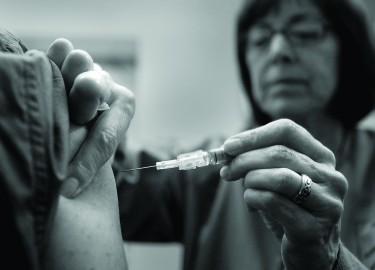Flu shot is not the only way to stay healthy

By Jackson Ly
The Guardsman
Staying healthy during the following months may be a challenge, especially with the seasonal flu running January through March, and getting a flu shot might not be enough to avoid contracting the flu.
“There’s no guarantee that it’s going to work,” said Benjamin Zappin, an acupuncturist and herbalist based in San Francisco.
According to the book “Natural Standard Herbal Pharmacotherapy,” flu vaccinations only contain three strains of the flu virus, and it does not protect against all other flu strains.
“It’s more important for people to minimize the risk of contracting the flu,” Zappin said, who suggests an alternative to the flu shot. “From a Chinese herbal perspective, astragalus is a preventative. It will support the immune system by warding of the [flu] viruses.”
Astragalus, an herb native to China, has the potential to boost the body’s immune system, according to National Center for Complementary and Alternative Medicine.
For patients who want to treat the flu, Zappin recommends eating elderberry products.
“Elderberries can be used when the flu virus is present in the body,” Zappin said. “It can shorten the duration of the flu.”
Not only are elderberries packed with antioxidants, the book “Natural Standard Herbal Pharmacotherapy” says that elderberries can help treat flu symptoms such as fever, fatigue, headache, sore throat, cough and aches and reduce the flu recovery time in half.
“Whether or not you get the flu shot, it’s still important to take other important measures into consideration,” Zappin said. “One of the most basic things you can do from getting sick is to wash your hands on a regular basis.”
Vaccinations serve the purpose of preventing and reducing outbreaks, according to the Influenza Health Advisory from the San Francisco Department of Public Health.
City College’s Paula Cahill, nurse practitioner at the Student Health Center, noted that 450 doses have been administered so far, and that 300 doses were administered for free back in October 2012 during the Annual City College of San Francisco Health Fair.
“Usually, it takes two weeks for the vaccination to take full effect,” Cahill said.
City College professor Susmita Sengupta explains that the “full effect,” refers to the body’s response to the vaccine.
“They can boost your immune cells to produce defense chemicals against potential viral infections,” Sengupta said.
Cahill mentions that faculty members, students and people six months and older are encouraged to get vaccinated.
“It’s not too late to get the flu shot because it’s [flu season] going to peak in February and March,” Cahill said.
